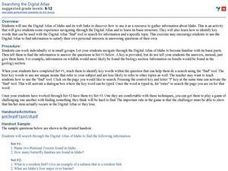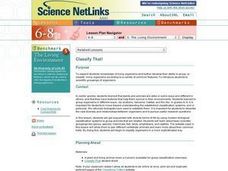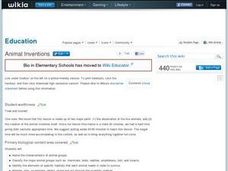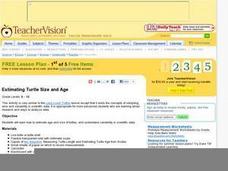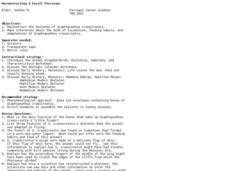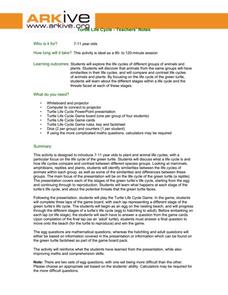Curated OER
Searching the Digital Atlas
High schoolers become familiar with the tools of a digital atlas. They use a digital atlas of Idaho to located specified information. Students identify national forests, locate butterfly families, find examples of resident fish, and...
Curated OER
Animal Categories
Pupils sort animal picture cards into classification groups such as mammals, reptiles, amphibians, insects and fish. They discuss the characteristics that each group of animals shares then arrange the pictures into a clasificatioon poster.
Curated OER
Toadstones, Snake Gods, and Divining Turtles
Students research facts about herps--reptiles and amphibians. They choose one or more facts to illustrate and create a drawing to be displayed.
Curated OER
Classifying Vertebrates
Second graders study animal characteristics and classification. In this animal characteristics and classifications lesson, 2nd graders determine how to classify vertebrates which include mammals, reptiles, amphibians, birds, and fish....
Curated OER
Soak it up
Students complete a hands on activity using hard boiled eggs, food coloring, tape, cups, water, and a knife to show how permeability affects animals. For this permeability lesson plan, students complete this activity and learn how...
Curated OER
Animal Classification
Third graders differentiate between vertebrates and invertebrates, and identify the main characteristics of mammals, fish, reptiles, amphibians, and birds. They sort and categorize different types of balls, discuss the characteristics...
Curated OER
Classifying Critters
In this classification worksheet, students describe the characteristics of the 5 groups of vertebrates and then complete 2 short answer questions.
Curated OER
Classify That!
Students get acquainted with diverse forms of life by using modern biological classification systems to group animals that are related. They explore basic scientific groupings like genus, species, mammals, fish, birds, amphibians, and...
Curated OER
Classify That!
Young scholars explore diverse forms of life by using modern biological classification systems to group animals that are related. Students then study basic scientific groupings like genus, species, mammals, fish, birds, amphibians, and...
Curated OER
Animal Classification
Young scholars recognize the six groups of animals (Mammals, fish, birds, reptiles, amphibians and arthropods) and their characteristics. In this animal characteristics lesson, students sort animals by their traits. Young...
Curated OER
Steppin' Out: Using Inquiry to Challente Alexander's Stride Analysis
Students distinguish between walking, jogging and running trackways in humans. They analyze the phylogenetic progression of the leg position as described by pace width and angulation, comparing amphibians, reptiles and mammals. Research...
Curated OER
Animal Inventions
Students name the characteristics of animal groups. Students classify the major animal groups such as: mammals, birds, reptiles, amphibians, fish, and insects. They identify the elements of specific habitats that each animal needs in...
Curated OER
Learning About Animals' Bodies
Students research different animals (mammals, reptiles, amphibians, insects, birds, fish) and create books, murals, dioramas, puppets, and sculptures to illustrate the necessity of various body parts for overall survival. In this animal...
Curated OER
Design an Exhibit
Students play the roles of exhibit designers in a zoo as they create a new exhibit for herps--amphibians and reptiles. They consider all the needs--light, heat, etc.
Curated OER
Estimating Turtle Size and Age
Students investigate how to estimate the age and size of turtles, and examine variability in scientific data. They read an informational handout, identify the parts of the shell, measure the shell and estimate the age, and record the...
Curated OER
Discover a Pond Food Web
Students study the biodiversity of animal life in a pond. They investigate the interdependence between pond organisms by completing a pond dipping activity and completing a checklist.
Curated OER
What's Your Classification
Students classify animals. In this animal groups lesson, students watch a video on animal groups and review the six animal groups. Students practice classifying animals using stuffed animals.
Curated OER
Focus on Food Chains
Third graders collect and analyze data about food chains. They conduct Internet research about the habitat of a selected organism, write a narrative, and create a computer slideshow using Kid Pix computer software that illustrates the...
Curated OER
Reconstructing a Fossil Pterosaur
Students reconstruct the skeleton of the fossil Scaphognathus crassirostis. In this fossil lesson plan, students discuss the Kingdoms of life, geologic history and the history of the skeletons of species. Students are given 20 minutes to...
Curated OER
Staying Up
Students will explain the Archimedes's Principle. In this lesson on plankton, students will describe three factors that can affect the buoyancy of plankton. This lesson contains extensive background information, extensions, and multiple...
Curated OER
The Census of Marine Life
Learners explain diversity and abundance in marine life. In this oceanic biology lesson, students collect information for various geographical areas to collect a census of marine life.
Curated OER
It's the Law
Students explain various scientific laws used in SCUBA diving. In this theory based lesson, students examine and explain how temperature, density, and salinity relate to SCUBA diving using various scientific laws to engage their learning.
Curated OER
What's Wild
Third graders discover the differences between wild and domestic animals. In this animal lesson, 3rd graders chart the differences in the animals and look through magazines for pictures of wild and domestic animals to glue to a poster....
ARKive
Turtle Life Cycle
Explore the wonders of the life cycle by first focusing on the growth and development of the green turtle. The class will discuss the life cycle of different plants and animals, then turn their attention to the green turtle. They view a...
Other popular searches
- Amphibians and Reptiles
- Amphibians Reptiles
- Amphibians and Reptiles K 2
- Amphibians and Reptiles K
- Reptiles Amphibians Fish
- Compare Reptiles Amphibians
- Amphibians and Reptiles Prek
- Reptiles Amphibians Birds
- Amphibians and Reptiles Unit
- Amphibians and Reptiles Perk
- Amphibians and Reptiles 3 5
- Reptiles Amphibians Anatomy


